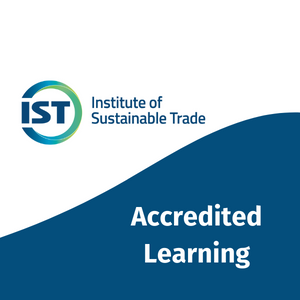Accredited Learning
To support IST members in their career journey, the IST offers a range of education and training programmes. These programmes are being developed to support IST members to:
- Gain a professional designation by taking a series of learning modules and examinations
- Maintain your minimum annual CPD hours
- Develop the key competencies for IST members as outlined in the IST Competency Framework
- Build an accredited education pathway with the IST and our education partners
The IST offers the
following education and training programmes and pathways:
The Certificate in International Trade provides practical knowledge and skills training to professionals working, or aspiring to work, in international trade or supply chain management and operations. The course equips professionals with the knowledge and skills they need to understand the key issues affecting the international trade industry, and to meet the challenges the industry faces in a post-Brexit trading environment.
The Institute of Sustainable Trade (IST) is relaunching the programme with accreditation from a leading Irish university in May, 2022, at Level 6 on the National Framework of Qualifications (pending). The newly launched course will include a new module on sustainability, to train professionals on how to help their organisations meet their sustainability targets, reduce transport and supply chains emissions and save on fuel and energy costs.
The Programme consists of 6 modules with 6 interactive training days delivered by expert trainers with decades of experience in international trade, supply chain management and sustainable business. Additional self-study materials are accessed through our Moodle Learning Management System. To pass the course, learners will be required to complete a multiple-choice test after each module and will also be required to submit a short, written assignment focusing on a customs journey case study.
For more information on the programme, please contact Niamh or Paul on training@irishexporters.ie or call 01 6612182.
Modules
Module 1: The Regulatory Framework of International Trade
Module 2: Tariff Codes and Classification
Module 3: Valuation and Origin
Module 4: Incoterms and International Contracts
Module 5: Sustainability in International Trade
Module 6: Import/Export Documentation & Procedures
Learning Outcomes
On completion of this programme, you will be able to:
- Identify the primary functions and responsibilities of the principal authorities and regulations governing international trade.
- Outline the processes for completing customs declarations for the import and export of a range of product types.
- Distinguish between the different Incoterms and describe how to decide the most suitable Incoterm for a range of goods and trading relationships.
- Describe the key features of classification, valuation and origin in the context of international trade.
- Identify the key sustainability issues and legislation affecting international trade.
Who should attend:
- Exporting and importing companies who wish to increase their knowledge and become more efficient in the evolving world of international trade
- Ambitious professionals and managers responsible for driving international trade and mitigating risk
- Individuals seeking employment in international trade, customs compliance or supply chain operations
- Professionals who wish to upskill in sustainable supply chain management
- Anyone involved in trade and investment, finance, supply chain operations and compliance
Certification and Benefits
Upon completion of the programme, graduates will receive:
- An accredited Certificate at Level 6 on the National Framework of Qualifications (5 ECTS) (pending)
- A digital badge award for sharing on e-portfolios, digital CVs and social channels such as LinkedIn
- 1-year free affiliate membership of the Institute of Sustainable Trade (IST) – launching May 2022
- 1-year full CPD hours for the Institute of Sustainable Trade (IST)
- Networking opportunities with industry peers
Detailed Course Content
Module 1: The Regulatory Framework of International Trade:
- Functions and key conventions of the World Trade Organisation (WTO), European Union (EU) institutions and the World Customs Organisation (WCO)
- The role of customs in international trade
- Overview of Free Trade Agreements (FTAs) with key examples of EU FTAs
- Overview of the EU-UK Trade and Cooperation Agreement (EU-UK TCA)
- Key functions of the Union Customs Code (UCC)
- Overview of the Registered Exporter System (REX)
- Overview of the Customs Decisions System (CDS)
- Key domestic stakeholders in international trade including government departments and agencies
Module 2: Tariff Codes and Classification
- Overview of customs classification
- International and EU classification coding systems
- Tools for classifying goods
- Rules of classification interpretation
- Using TARIC to find commodity codes
- Products with multiple classifications
- Classification of parts of goods
- Overview of Binding Tariff Information (BTI)
- When and how to apply for BTI
Module 3: Valuation and Origin
- Overview of customs valuation
- Purposes of customs valuation
- The six methods of determining customs valuation
- Case studies on how to determine the value of goods for customs purposes
- The concept of origin in international trade
- Preferential agreements and their implications on origin of goods
- The differences between preferential and non-preferential origin
- When and how to apply for a Certificate of Origin
- Principles of origin for combined articles
- Principles of origin for mixed origin goods
- Case studies on how to determine the origin of complex good
Module 4: Incoterms and International Contracts
- Description of the 11 Incoterms and what they cover
- The impact of Incoterms on international trade
- Incoterms – the seller’s perspective
- Incoterms – the buyer’s perspective
- Choosing the right Incoterm for a product and trade journey
- Case studies using key Incoterms
- Overview of international commercial contracts
Module 5: Sustainability in International Trade
- Definitions of sustainability
- An overview of the UN Sustainable Development Goals (SDGs)
- An overview of circular economy principles
- An overview of climate change and its impact on international trade
- An overview of key global, European, and national agreements and legislation on climate change
- An overview of how to use the Global Logistics Emissions Council (GLEC) Framework to calculate transport and freight emissions
- Strategies for setting carbon emissions reductions targets
- Key tools for reporting carbon emissions
- An overview of sustainable procurement practices using the Smart Freight Procurement Guidelines
Module 6: Import/Export Documentation & Procedures:
- Common terms and definitions in import/export
- An overview of the main IT Systems for import/exports
- An overview of the customs journey
- How to complete customs declarations for imports and exports
- Transit procedures
- Warehousing
- Customs authorisations
- The Customs Decision System (CDS)
- Post-Brexit changes to Ireland – Northern Ireland – Great Britain trade
- Case studies on the movement of goods between Ireland, Britain, Europe and Asia
- Benefits of Authorised Economic Operator (AEO) trusted trader status
Certificate in International Trade – Summary | |
Duration: | 8 Weeks, including 6 full-days of lectures |
Training delivery: | Online via MS Teams |
Additional resources: | E-booklet with lecture slides, study notes, case studies and further reading via Moodle LMS |
Assessment: | 6 multi-choice tests & a written customs journey assignment of 500-800 words (samples will be provided) |
Accreditation & Certification: | Certificate Micro-credential, Level 6, 5 ECTS Credits Digital badge award for sharing on LinkedIn, e-portfolio |
The IST is delighted to be partnering with Arizona State University (ASU) to offer free sustainable business e-learning training to IST members. The Sustainable Earth courses have been specially designed for business professionals to increase their sustainability know-how, save time and money, attrack new customers and talent and drive long-term growth.
Course Titles
- Fundamentals of Sustainable Supply Chains
- Fundamentals of Circular Economy
- Fundamentals of Organisational Sustainability
- Fundamentals of GRI Reporting
- Fundamentals of ESG Reporting
- Fundamentals of Greenhouse Gas Reporting
- Fundamentals of CDP Reporting
- Intermediate CDP Reporting
- Advanced CDP Reporting

IST Accredited Education Pathways (in development)
The IST will offer a professional certificate and a professional diploma to members who wish to build a pathway of accredited micro-credentials across the three IST learning pillars of Leadership, Sustainability and International Trade.
This will combine three accredited micro-credentials. Each of these three programmes can be taken as a standalone micro-credential award at Level 6. The programmes will equip learners with practical knowledge and skills that can be applied in their organisations.
Learners have flexibility to complete one, two or all three of these awards depending on their availability and professional development needs. Learners who complete all three programmes are awarded the Professional Certificate in Sustainable Trade Management from the IST.
- Certificate in International Trade (Level 6, 5 ECTS)
- Certificate in Leadership Fundamentals (Level 6, 5 ECTS)
- Certificate in Sustainable Supply Chains (Level 6, 5 ECTS)
This combines accredited micro-credentials from leading Irish universities. Each of these programmes can be taken as a standalone micro-credential award at Level 9. Learners have flexibility to complete between one and four of these awards depending on their availability and professional development needs. Learners who complete all four programmes are awarded the Professional Diploma in Sustainable Trade Management from the Institute of Sustainable Trade, in addition to micro-credentials for each programme from the university provider.
- International Trade Management (Level 9, 10 ECTS)
- Transversal Skills (Level 9, 5 ECTS X 2)*
- Sustainability Leadership (Level 9, 10 ECTS)
*Choice of two of four Transversal Skills micro-credentials delivered by the IST’s Convene partners TU Dublin and UCD Innovation Academy:
- Creative Thinking and Innovation
- Global Citizenship in the Workplace
- Digital Entrepreneurship OR Sustainable Economies
- Leadership Development
The Transversal Skills programme is eligible for Springboard+ funding. Click here for details.
Note that programmes at Level 9 will have minimum entry requirements as set by the universities. The programmes listed above, with the exception of the Certificate in International Trade and the Transversal Skills programme, are currently in development. To join the waiting list for these programmes, please email training@instituteofsustainabletrade.ie.

